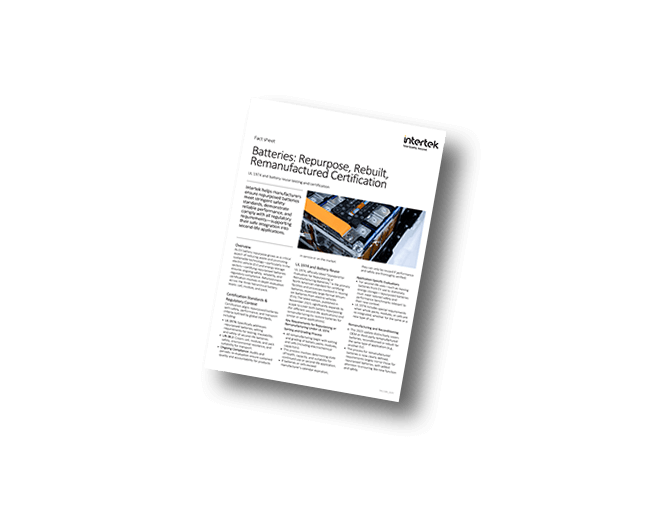Understanding UL 1974 and battery reuse evaluation, battery repurpose, rebuild, and remanufacture certification
What Is UL 1974?
UL 1974, Standard for Evaluation for Repurposing or Remanufacturing Batteries, is the leading North American safety standard for remanufactured lithium-ion batteries. It applies to cells, modules, and packs that are either repurposed for new applications—such as moving an EV battery into a stationary energy storage system—or remanufactured for the same use, such as returning a rebuilt pack to another vehicle.
By setting requirements for testing, traceability, and labeling, UL 1974 helps ensure that remanufactured batteries deliver safe and reliable performance throughout their extended lifecycle.
Why UL 1974 Certification Matters?
With the rapid growth of electric vehicles (EVs) and energy storage systems (ESS), millions of large-format batteries are reaching the end of their initial service life. Certification under UL 1974 validates that these remanufactured or repurposed batteries are safe, reliable, and compliant with global standards. This process not only supports product safety but also strengthens sustainability by reducing waste and promoting a circular economy.
As demand for sustainable energy storage grows, repurposing and remanufacturing lithium-ion batteries has become vital to reducing waste and extending product life.
UL 1974 Evaluation Process
UL 1974 provides a structured framework to verify the safety, performance, and reliability of remanufactured batteries at the cell, module, and pack levels.
Sorting and Grading
The process begins with evaluating the state of health (SOH) and capacity of each unit. Batteries that have exceeded their original expiration date may only be reused if testing confirms they continue to meet strict safety and performance requirements.
Electrical and Performance Testing
Comprehensive testing ensures that remanufactured batteries perform consistently under real-world conditions. Key evaluations include:
- Capacity retention and charge/discharge stability
- Internal resistance measurements
- Cell balancing verification
Safety Testing
UL 1974 requires robust safety testing to identify potential hazards. Typical evaluations include:
- Short circuit protection
- Overcharge and overdischarge response
- Thermal behavior and management
In addition, the Battery Management System (BMS) must be validated to confirm proper cutoff mechanisms, fault detection, and protective functions are in place.
Routine Diagnostics and Maintenance
Beyond initial certification, facilities must demonstrate the ability to conduct ongoing inspections and diagnostics without full disassembly. This includes:
- Open circuit voltage checks
- High-voltage isolation testing
- BMS self-tests
These requirements ensure continued safety and reliability throughout the battery’s second-life application.
Labeling and Documentation
To maintain transparency and traceability, all certified products must be clearly identified as “Repurposed” or “Remanufactured” and labeled with:
- UL 1974 certification mark
- Chemistry and ratings
- Date codes and manufacturer details
Complete documentation, including maintenance guidelines and traceable test records, must accompany each certified unit.
Facility and Process Requirements
UL 1974 is not only a product standard but also a process standard. Certification requires facilities to demonstrate strong technical competency in battery systems and remanufactured or repurposed methods. Worker qualifications, safety procedures, and robust process controls for sorting, grading, and reassembly are essential.
Knowledge Center
Top-10 FAQs about the UN 38.3 8th Edition
Techniques & Methods of Li-Ion Battery Failure Analysis: Webinar | White Paper
IEC 62133 and the Lithium-ion Battery Compliance Roadmap - webinar recording
UN 38.3 and the Transportation of Lithium Batteries: A Webinar Series
Battery Energy Storage Systems (BESS) for On- and Off-Electric Grid Applications - white paper
Energy Storage Systems: Product Listing & Certification to ANSI/CAN/UL 9540
Top-8 FAQs of Failure Analysis
Hoverboards, UL 2272 and You! - webinar recording
Consulting, Registration, and Recycling Services for Product Packaging and Batteries
Global Market Access for batteries - webinar recording
Reliable propagation testing: trigger methods, standards and subsystems - webinar recording
Abuse vs. performance testing - webinar recording
Common mistakes in abuse testing: Managing influencing factors, test accuracy and environmental conditions - webinar recording
Battery cell performance testing – ensuring quality, reliability, and market readiness - webinar recording
Battery testing standards: IEC, UL and UN – comparison and outlook - webinar recording


